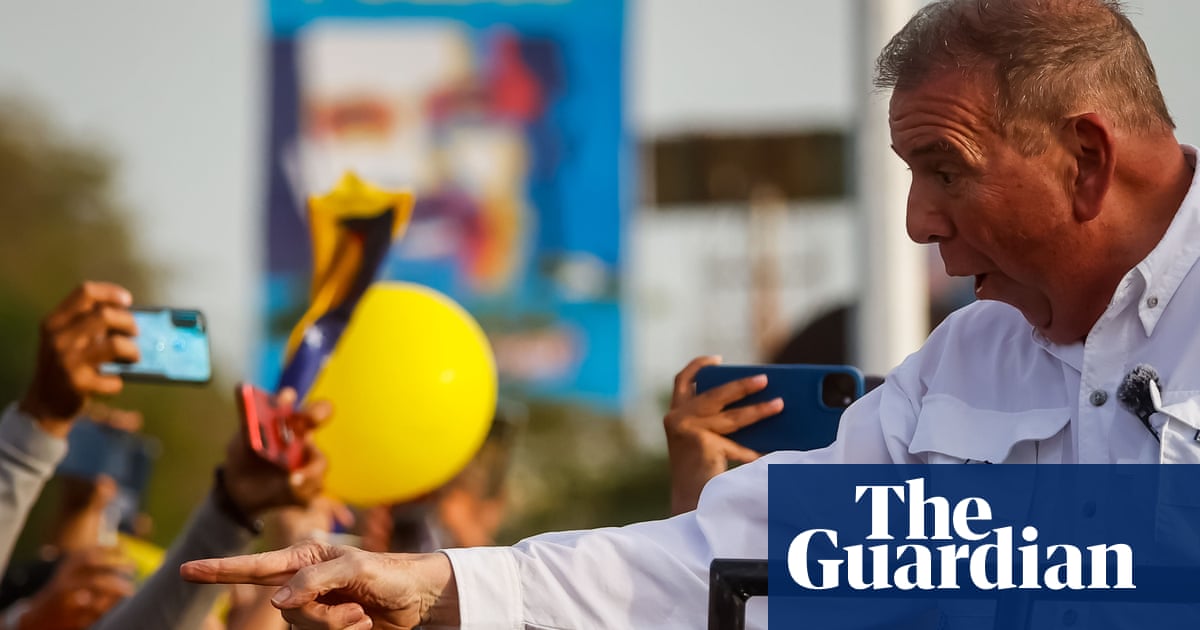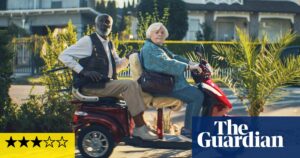
The soft-spoken septuagenarian who could be on the brink of leading Venezuela into a new political era has promised to build a country of prosperity, democracy and peace if he is elected president, and vowed to govern for all citizens – including supporters of his authoritarian rival Nicolás Maduro.
Retired diplomat Edmundo González Urrutia is leading the polls ahead of the South American country’s 28 July presidential election, despite never having sought elected office and, until recently, being unknown to voters.
Speaking to the Guardian at his home overlooking the capital, Caracas, the 74-year-old admitted his late-life transformation from retired ambassador to the possible future leader of the country with the world’s largest proven oil reserves had come as a surprise.
“The truth is, I had absolutely no plans to be a presidential candidate … much less to be president,” said González, who retired after serving as Venezuela’s ambassador to Buenos Aires from 1998 to 2002.
That changed suddenly in April when González agreed to be the stand-in presidential candidate for the Venezuelan opposition after its standard-bearer, María Corina Machado, and her stopgap were both prevented from running by authorities. With the support of Machado, a charismatic and outspoken former congresswoman who has spent years building a reputation as a fierce critic of Maduro’s Socialist party, the ex-ambassador is now topping the polls.
“I haven’t the slightest doubt that triumph is assured on 28 July. I say this clearly, firmly and with all the joy of knowing that we’re going to win. Absolutely all of the polls we are seeing right now give us a major advantage over the government candidate,” González said over coffee at an apartment crammed with family portraits and Catholic imagery portraying figures such as the Virgin of the Valley and Venezuela’s ‘doctor of the poor’, José Gregorio Hernández.
Perhaps sensing the growing threat of González’s challenge, Maduro has in recent days stepped up his verbal attacks on the low-key career diplomat. “There’s a decrepit old man who wants to take power in Venezuela,” the 61-year-old incumbent, who has held power since 2013, bellowed during a recent rally in the city of Barquisimeto.
González, who has decades of experience in international relations and diplomacy, has avoided taking the bait. “We are going to build a country where the president doesn’t insult [people],” he said at a recent campaign event, a theme he returned to during this week’s early morning interview.
“[I want to build] a prosperous, democratic and peaceful country, where citizens respect each other, where we don’t need anyone shouting at us, insulting us – a country of and for everyone,” said González, who struck a conciliatory tone with supporters of Venezuela’s current leader and his predecessor Hugo Chávez.
Asked for his message to Chavistas who were frustrated with the economic turmoil of Maduro’s 11-year rule but were fearful of Machado’s fiery anti-leftwing rhetoric, he answered: “I am the candidate and my line has always been that we will be a government for everyone. Here, nobody will be excluded. Here, we will not view our opponent as an enemy but simply as a political adversary.”
González made clear, however, that Machado – who has vowed to rid Venezuela of socialism – would play a major role in any future administration. “She’s an essential leader in the process … She will have whatever role she desires in the government,” he said.
For all the opposition enthusiasm, much could still happen in the days before a vote many see as Venezuela’s last chance of rescuing its democracy and its economy from one of the most brutal peacetime depressions in decades.
Some fear Maduro – who claims he is confident of victory and blames US sanctions for his country’s economic collapse – could still scupper González’s candidacy or manufacture a security crisis to justify suspending the vote.
“[Venezuela is] fundamentally a dictatorship … [Maduro] controls the courts, he controls the electoral authorities, he controls the police, the secret police and the military. So he could do whatever he wants, practically speaking,” said Benjamin Gedan, a former South America director on the national security council at the White House who runs the Wilson Center’s Latin America Program. What Maduro will do “depends how terrified he is, and it depends how successful the international diplomacy is in trying to constrain him”.
Even if the election does happen and the opposition wins, many observers are skeptical Maduro will accept the result and relinquish power, for fear of ending up in prison or condemning his movement to political oblivion. Several top government figures, including the president, face drug trafficking charges in the US while the international criminal court (ICC) is investigating alleged human rights abuses committed by Maduro’s security forces.
Experts say the Venezuelan strongman will need concrete guarantees if he loses the election and there is to be a smooth transition before his successor’s swearing-in in January 2025. “Guarantee is a technical term for a get out of jail free card,” said Gedan, arguing that Chavismo would also need assurances that it would be allowed to continue as an active political movement and contest an election six years from now.
González has avoided commenting on thorny issues such as whether Maduro could be offered an amnesty from prosecution as part of a handover deal. But the presidential frontrunner hoped that the almost six-month gap between July’s election and January’s inauguration would throw up “new spaces and political scenarios, the realities of which we cannot yet see but which could provoke new realities and new circumstances for everyone”.
Addressing supporters this week, Machado said: “For his own good … I hope Nicolás Maduro accepts a negotiation process that allows an orderly and sustainable transition”.
Gedan said it was wishful thinking to imagine the election producing “overnight democratization”. But what was possible – and perhaps the best-case scenario – was “a very complex, uncertain, but still promising political transition”.
“Even if it takes years. Even if the Chavista elites remain in impunity. Even if corrupt actors and human rights abusers aren’t brought to justice. Even if some of the branches of government end up in the hands still of bad actors. That’s a great scenario for Venezuela given what it’s been living.”
Source: theguardian.com


















